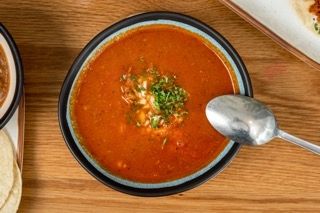Is Mexican Food Healthy? Unpacking the Nutritional Perks of Conventional Ingredients
The concern of whether Mexican food is healthy welcomes an exploration of its traditional components. Beans and corn act as fundamental staples, abundant in protein and fiber. Avocados give helpful fats, while different natural herbs and seasonings add taste and health and wellness advantages - hand crafted margarita. With each other, these components develop a tapestry of nutrition. The healthiness of Mexican cuisine often depends on preparation techniques and section sizes. What function do these variables play in determining its general dietary worth?
The Power of Beans: Protein and Fiber-Rich Staples
Usually neglected, beans offer as a keystone of Mexican food, using a wealth of nutritional advantages. Rich in healthy protein, they are a superb plant-based alternative for those seeking to satisfy their nutritional healthy protein requires. This high healthy protein content supports muscle mass repair service and growth, making beans invaluable for both meat-eaters and vegetarians alike. Additionally, beans are a phenomenal resource of dietary fiber, which assists in food digestion and advertises a sensation of volume, possibly aiding with weight management.
The selection of beans utilized in Mexican meals, such as black beans, pinto beans, and kidney beans, contributes to a diverse flavor profile and can enhance dishes nutritionally. Moreover, beans are low in fat and include vital nutrients, consisting of iron, magnesium, and folate. Together, these characteristics make beans a vital active ingredient, providing both nutrition and sustenance in typical Mexican price.

Corn: a Versatile Grain With Nutritional Advantages
Corn attracts attention as a flexible grain basic to Mexican cuisine, celebrated not just for its cooking applications however additionally for its excellent dietary profile. As a primary component in recipes like tortillas, tamales, and pozole, corn offers crucial nutrients that contribute to a well balanced diet regimen. Rich in carbohydrates, it functions as a substantial energy source, while likewise being reduced in fat, making it a beneficial choice for numerous dietary demands.
Corn is a good resource of dietary fiber, which helps in digestion and advertises satiation. It contains considerable amounts of vitamins such as B-complex vitamins, which are essential for energy metabolic rate. The presence of antioxidants, especially carotenoids, adds to overall health by lowering oxidative stress. Additionally, corn is gluten-free, dealing with those with gluten sensitivities. Generally, the dietary advantages of corn emphasize its importance in standard Mexican food and its duty in a healthy and balanced diet.
Avocados: Healthy Fats and Nutrients in Every Bite
Avocados play a considerable function in Mexican food, matching recipes with their creamy texture and rich taste. Past their cooking allure, avocados are commemorated for their outstanding nutritional profile. They are an abundant resource of healthy and balanced monounsaturated fats, which can assist reduced poor cholesterol degrees and support heart health and wellness. In addition, avocados are loaded with crucial vitamins and minerals, consisting of potassium, vitamin E, and B vitamins, contributing to overall wellness.
The high fiber content in avocados help food digestion and advertises satiation, making them a valuable enhancement to any kind of dish. Their distinct nutrient composition can also sustain skin wellness and supply anti-inflammatory advantages. Incorporating avocados into conventional Mexican dishes or appreciating them as a standalone snack can enhance both taste and nourishment, demonstrating why they are a beloved staple in Mexican cuisine. On the whole, avocados supply a delicious means to appreciate healthy and balanced fats and important nutrients in every bite.

Herbs and flavors: Flavorful Wellness Boosters
While taking pleasure in the abundant flavors of Mexican food, see one can not ignore the essential function that spices and natural herbs play in enhancing both taste and wellness. Ingredients such as cilantro, chili, and oregano peppers not just add to the dynamic taste account yet also breakfast restaurants supply substantial health and wellness benefits. For instance, cilantro is known for its purifying residential properties, assisting to eliminate heavy steels from the body, while oregano is loaded with anti-oxidants and possesses anti-inflammatory effects.
Chili peppers, a staple in many Mexican dishes, contain capsaicin, which has been linked to improved metabolism and pain relief. Furthermore, flavors like cumin and coriander support digestion and may help in blood glucose guideline. Including these flavorful wellness boosters right into dishes not just improves the culinary experience however likewise advertises general wellness, making Mexican cuisine not simply scrumptious, yet likewise nutritionally useful.
Typical Food Preparation Techniques: Enhancing Nutrition and Flavor
Typical food preparation techniques in Mexican cuisine play a crucial duty in improving both nutrition and taste, as they usually focus on fresh active ingredients and classic strategies. Strategies such as nixtamalization, where corn is soaked and prepared in an alkaline remedy, not only boost the nutrient account of tortillas but additionally improve their digestibility - lunch and dinner. Furthermore, the use of slow-moving food preparation techniques, like cooking or braising, enables tastes to combine wonderfully while retaining the stability of the components
Frequently Asked Questions
Are Mexican Food Portions Usually Larger Than Other Foods?
Mexican food sections are commonly larger than those of many various other cuisines. This particular shows conventional dining techniques, highlighting communal sharing and hearty dishes, which can cause a much more considerable serving dimension in general.
Just how Does the Prep Work Method Affect Healthfulness of Mexican Food?
Preparation methods considerably influence the healthfulness of Mexican food. Techniques such as cooking check or steaming protect nutrients, while frying can increase undesirable fat material. Options of ingredients and cooking designs eventually determine general dietary worth.
Can Mexican Food Be Tailored for Specific Nutritional Constraints?
Mexican food can undoubtedly be tailored for specific nutritional restrictions. Replacements, such as utilizing corn tortillas for gluten-free diets or integrating more vegetables, make it possible for individuals to enjoy standard flavors while suiting different dietary needs.
What Prevail Mistaken Beliefs About Mexican Food and Wellness?
Common misunderstandings concerning Mexican food include the idea that it is naturally unhealthy, overly hot, and only focused on fats. In truth, standard recipes typically include nourishing ingredients and can be tailored to different nutritional demands.
Exist Much Healthier Choices at Mexican Dining Establishments?
Much healthier alternatives at Mexican dining establishments frequently include barbequed meats, beans, and fresh veggies. Selecting dishes that highlight entire components and staying clear of hefty sauces can bring about an extra nourishing eating experience, advertising overall well-being.
The selection of beans utilized in Mexican meals, such as black beans, pinto beans, and kidney beans, adds to a varied flavor profile and can improve dishes nutritionally. Avocados play a substantial duty in Mexican food, matching meals with their velvety structure and rich taste. Integrating avocados into traditional Mexican dishes or appreciating them as a standalone treat can improve both flavor and nutrition, demonstrating why they are a beloved staple in Mexican cuisine. While enjoying the rich tastes of Mexican food, one can not ignore the important function that spices and herbs play in enhancing both taste and wellness. Typical food preparation techniques in Mexican cuisine play an essential function in enhancing both nourishment and taste, as they typically prioritize fresh ingredients and classic methods.